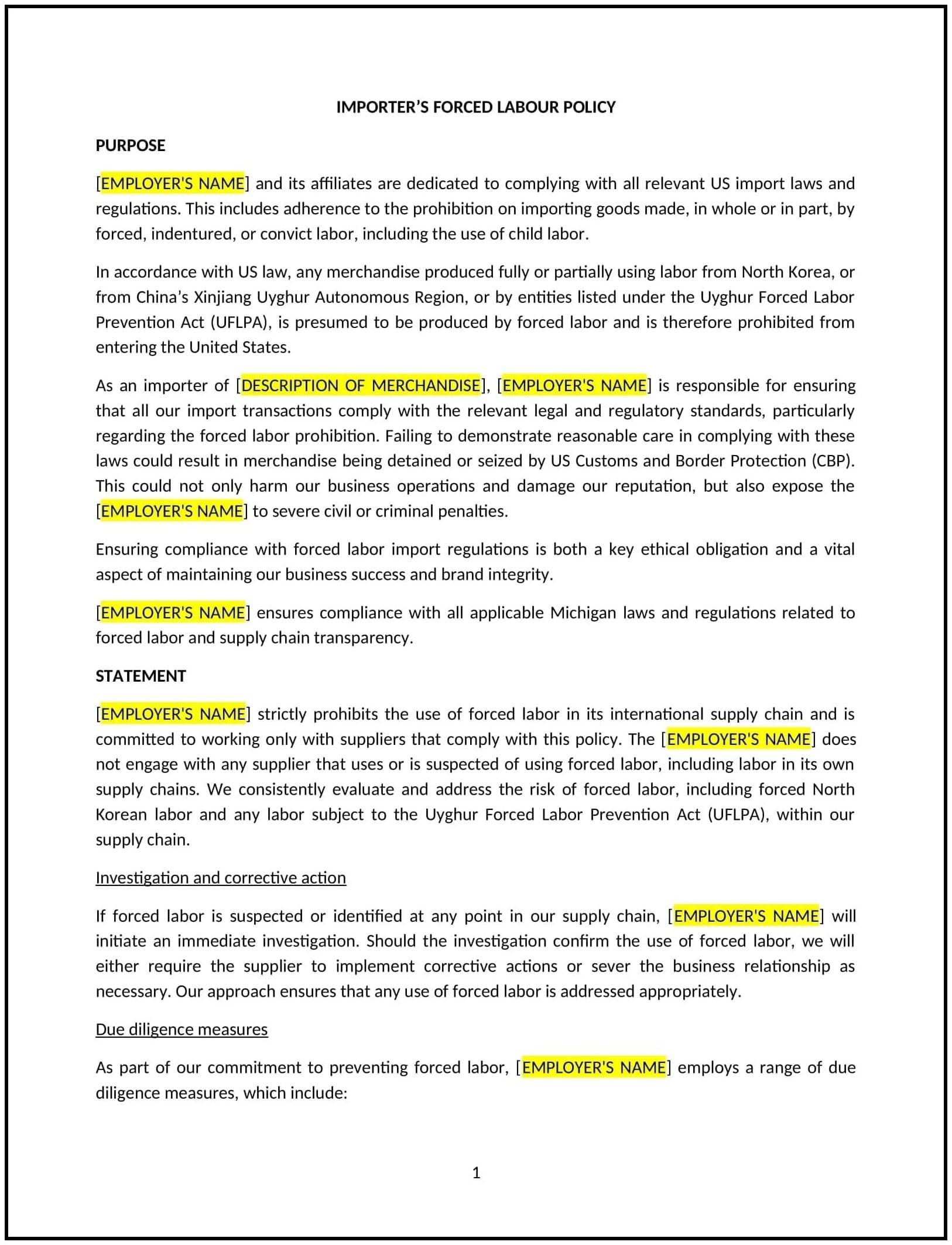Importer's forced labour policy (Michigan): Free template
Got contracts to review? While you're here for policies, let Cobrief make contract review effortless—start your free review now.

Customize this template for free
Importer's forced labour policy (Michigan)
An importer's forced labour policy provides Michigan businesses with guidelines to ensure that their supply chains are free from forced labor and human trafficking. This policy helps businesses comply with federal and state laws, including the California Transparency in Supply Chains Act and the UK Modern Slavery Act, by outlining the steps they will take to prevent and address forced labor in their operations and supply chain.
By adopting this policy, businesses can promote ethical sourcing, enhance corporate responsibility, and mitigate legal risks related to human trafficking and forced labor.
How to use this importer's forced labour policy (Michigan)
- Define forced labor and human trafficking: Clearly define what constitutes forced labor and human trafficking, including indicators such as debt bondage, coercion, or involuntary servitude, to ensure that all employees and partners understand these terms.
- Assess supply chains: Conduct regular risk assessments of the supply chain to identify potential areas where forced labor may be present, such as regions with high incidences of human trafficking or industries known for labor exploitation.
- Implement due diligence processes: Establish procedures for screening suppliers and partners to ensure they adhere to ethical labor practices, including reviewing their labor policies, conducting audits, and requiring transparency in sourcing.
- Set clear expectations for suppliers: Communicate expectations regarding forced labor prevention to suppliers, including the requirement to abide by the business’s anti-forced labor policy and demonstrate compliance through certifications or audits.
- Provide training: Offer regular training for employees, especially those involved in procurement, sourcing, and supplier management, on identifying signs of forced labor, addressing human trafficking, and ensuring supply chain compliance.
- Monitor and audit: Conduct periodic audits of suppliers and contractors to verify that they are adhering to ethical labor practices and investigate any concerns or allegations of forced labor or human trafficking.
- Respond to violations: Establish a clear process for addressing violations of the policy, including investigating allegations, terminating relationships with non-compliant suppliers, and taking corrective actions to prevent future occurrences.
- Maintain transparency: Disclose the business’s efforts to combat forced labor in its supply chain, including the steps taken, audit results, and actions taken in response to any violations.
Benefits of using this importer's forced labour policy (Michigan)
This policy provides several key benefits for Michigan businesses:
- Promotes ethical sourcing: The policy ensures that businesses engage in responsible sourcing practices and help combat human trafficking and forced labor in the global supply chain.
- Reduces legal risks: By actively preventing forced labor and human trafficking, businesses can mitigate the risk of legal consequences, such as fines, lawsuits, or reputational damage from non-compliance with labor laws.
- Enhances reputation: A commitment to ethical labor practices enhances the business’s reputation with customers, investors, and the public, leading to increased trust and loyalty.
- Strengthens supplier relationships: Businesses that demonstrate a commitment to forced labor-free supply chains foster stronger relationships with suppliers who share similar ethical values, leading to more stable and long-term partnerships.
- Increases employee morale: Employees working for companies that prioritize human rights and ethical sourcing feel more proud and engaged in their work, leading to higher productivity and retention rates.
Tips for using this importer's forced labour policy (Michigan)
- Communicate the policy: Ensure that employees, especially those involved in procurement or supplier management, are aware of the policy by including it in the employee handbook, during onboarding, and through regular training sessions.
- Conduct regular audits: Regularly assess suppliers for compliance with the policy by conducting both announced and unannounced audits, checking for signs of forced labor or unethical practices in their operations.
- Collaborate with industry groups: Join industry groups or initiatives focused on eliminating forced labor in global supply chains, allowing the business to share best practices and stay informed about evolving laws and trends.
- Keep documentation: Maintain thorough documentation of all actions taken to comply with the policy, including supplier assessments, audit results, and any corrective actions taken, to demonstrate the business’s commitment to ethical sourcing.
- Review periodically: Regularly review and update the policy to ensure it is in line with Michigan laws, federal regulations, and international standards on labor rights and human trafficking.